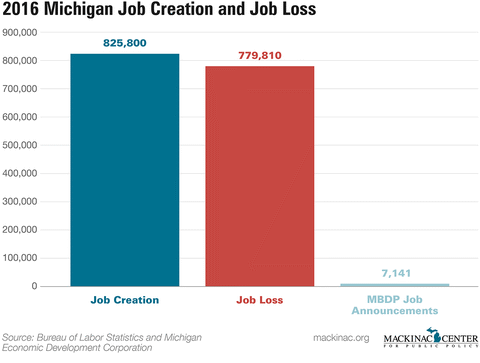Commentary
New Subsidies Show Which Groups Are Important to Lansing Politicians
Improving the rules for everyone puts residents first
The state recently approved its latest round of business subsidies, announcing that three companies would receive taxpayer money to create “at least” 1,500 new jobs. If history is a guide, few of these jobs will ever materialize. But monthly award announcements from the state serve as reminders that there are specific people that state lawmakers care about more about than residents.
Each of these announcements come with a real cost. The three companies mentioned in the latest announcement have had $9.75 million in taxpayer dollars dangled in front of them. In state budget terms, that’s not much. But it’s also a drop in the bucket of the $884 million in business subsidies the state is expected to deliver to favored companies in the upcoming year.
This is frustrating when there are many other things that can be done with this money. These dollars can be used to rebuild roads, pay teachers or even returned to taxpayers. The amount that we’re going to hand out this year is enough to decrease the state income tax to 3.9 percent from 4.25 percent. Instead, it gets spent on favors.
There is hype around the projects that get state money, but these favors don’t do what their supporters say they do. They do not create jobs. In fact, they lose them. These subsidies also concentrate benefits in the hands of specific business owners, doing so at the expense of others. Every dollar awarded has to come from taxpayers in the first place. Or, it could have been spent anywhere else the state government wants. Perhaps a project with a wider public benefit.
Even if Lansing politicians justify the costs of their payments to business interests, they do not have the scope to improve the economy. In 2016, Michigan’s private sector both created 825,800 jobs and lost 779,810 jobs. State favors given through its primary business grant, the Michigan Business Development Program, only offered assistance to 84 companies to create 7,141 jobs. That’s less than 1 percent of jobs that disappeared during the period — and the state has a bad record of turning job announcements into reality.

Lawmakers should take their fingers off the scales and get back to the basics. Building a better environment for everyone to do business actually works. That means having a competent and effective government and setting up the same rules for everyone to play by. Then, lawmakers would be putting residents first.
|

New Subsidies Show Which Groups Are Important to Lansing Politicians
Improving the rules for everyone puts residents first
The state recently approved its latest round of business subsidies, announcing that three companies would receive taxpayer money to create “at least” 1,500 new jobs. If history is a guide, few of these jobs will ever materialize. But monthly award announcements from the state serve as reminders that there are specific people that state lawmakers care about more about than residents.
Each of these announcements come with a real cost. The three companies mentioned in the latest announcement have had $9.75 million in taxpayer dollars dangled in front of them. In state budget terms, that’s not much. But it’s also a drop in the bucket of the $884 million in business subsidies the state is expected to deliver to favored companies in the upcoming year.
This is frustrating when there are many other things that can be done with this money. These dollars can be used to rebuild roads, pay teachers or even returned to taxpayers. The amount that we’re going to hand out this year is enough to decrease the state income tax to 3.9 percent from 4.25 percent. Instead, it gets spent on favors.
There is hype around the projects that get state money, but these favors don’t do what their supporters say they do. They do not create jobs. In fact, they lose them. These subsidies also concentrate benefits in the hands of specific business owners, doing so at the expense of others. Every dollar awarded has to come from taxpayers in the first place. Or, it could have been spent anywhere else the state government wants. Perhaps a project with a wider public benefit.
Even if Lansing politicians justify the costs of their payments to business interests, they do not have the scope to improve the economy. In 2016, Michigan’s private sector both created 825,800 jobs and lost 779,810 jobs. State favors given through its primary business grant, the Michigan Business Development Program, only offered assistance to 84 companies to create 7,141 jobs. That’s less than 1 percent of jobs that disappeared during the period — and the state has a bad record of turning job announcements into reality.
Lawmakers should take their fingers off the scales and get back to the basics. Building a better environment for everyone to do business actually works. That means having a competent and effective government and setting up the same rules for everyone to play by. Then, lawmakers would be putting residents first.
Michigan Capitol Confidential is the news source produced by the Mackinac Center for Public Policy. Michigan Capitol Confidential reports with a free-market news perspective.
More From CapCon